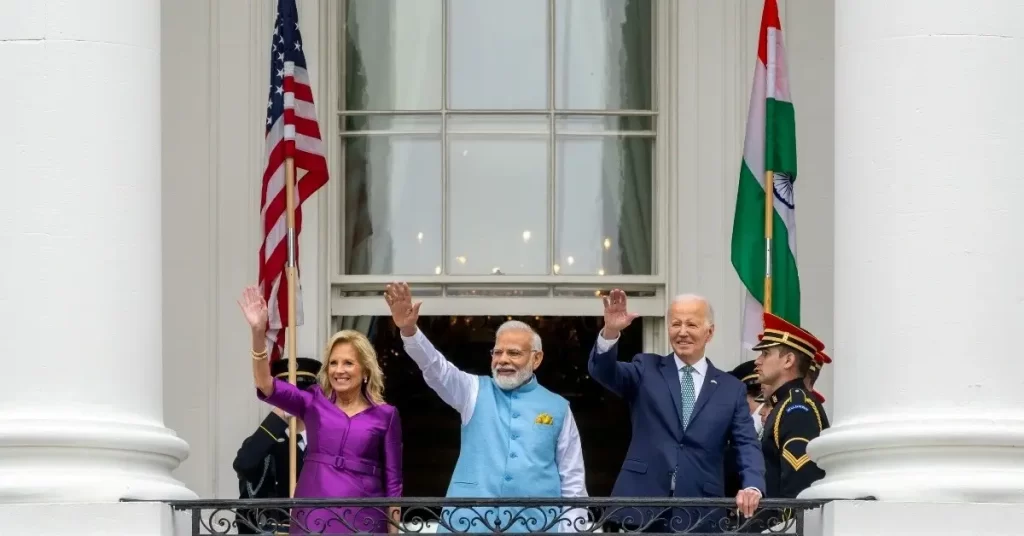Joe Biden Hosts Grand Reception for Indian Prime Minister Narendra Modi
President Joe Biden’s decision to throw a lavish state dinner for Indian Prime Minister Narendra Modi has stirred controversy, given the accusations of human rights abuses leveled against the Indian government. This move highlights the delicate balance between Biden’s campaign principles, the realities of governance, and the pursuit of geopolitical interests. As the world’s largest democracy, India’s growing economy and its potential as a counterweight to China have become critical factors in shaping the U.S.-India partnership.
Human Rights Concerns and Awkward Diplomacy:
Despite the Biden administration’s accusations of India’s participation in unlawful killings, restrictions on freedom of speech, and violence against religious and ethnic minorities, a grand state dinner is being held to honor Prime Minister Modi. Critics argue that this raises questions about the tension between Biden’s emphasis on strengthening democracy and the diplomatic realities he faces as president. The situation becomes increasingly awkward when organizations tracking democracy downgrade India’s status, with Freedom House now rating it only partially free.
Progressive representatives such as Rep. Rashida Tlaib have decided to boycott Modi’s address to Congress, citing his long history of human rights abuses and anti-democratic actions. Tlaib’s sentiment is echoed by Reps. Cori Bush and Alexandria Ocasio-Cortez, who also protest the event. The White House maintains that Biden will raise human rights concerns during private discussions with Modi, emphasizing the importance of the topic in Biden’s foreign policy agenda.
Erosion of Trust and Democratic Backsliding:
India’s judiciary system is experiencing erosion of trust, exemplified by the conviction of one of Modi’s chief political opponents, Rahul Gandhi, for defamation. Many view this case as highly political, potentially barring Gandhi from competing in India’s upcoming national elections. Modi’s government has been accused of using state institutions to target political opponents, and discriminatory policies against minority populations, particularly Muslims, have grown. Such actions have drawn concern from organizations like Freedom House, which highlight the discrepancy between India’s thriving election system and these troubling policies.
Ukraine Conflict and Geopolitical Considerations:
Another pressing issue on the agenda during Modi’s visit is the war in Ukraine. The United States seeks India’s support in pressuring Russia by joining efforts to cripple its economy. However, India’s reluctance to denounce Russia and its continued purchase of Russian oil complicate matters. The Biden administration faces challenges in exerting meaningful pressure on India due to its perceived leverage in the U.S.-India relationship, as Biden aims to maintain positive relations and leverage India’s potential as a counterweight to China.
Strategic Importance of U.S.-India Partnership:
Despite the controversies and challenges, the Biden administration recognizes the strategic importance of a strong U.S.-India partnership. With a population nearing 1.4 billion people, India is poised to become the world’s third-largest economy, trailing only China and the United States. Biden seeks to deepen the security partnership with India through initiatives like the Quad, a group aimed at countering China’s global influence. Recognizing the economic and geopolitical significance, the White House sees the state dinner as an opportunity to foster a long-term, strong relationship with India.
Conclusion:
President Joe Biden’s decision to host a lavish state dinner for Indian Prime Minister Narendra Modi has sparked debate and criticism due to concerns about India’s human rights record. However, the Biden administration is navigating the complexities of balancing diplomatic relations, strategic interests, and democratic principles. As India emerges as an emerging superpower and potential counterweight to China, the United States seeks to strengthen its partnership with India while addressing concerns related to human rights and geopolitical considerations. The state dinner signifies an attempt to strike a delicate balance, recognizing both the importance of democratic values and the pursuit of national interests in shaping U.S.-India relations.



